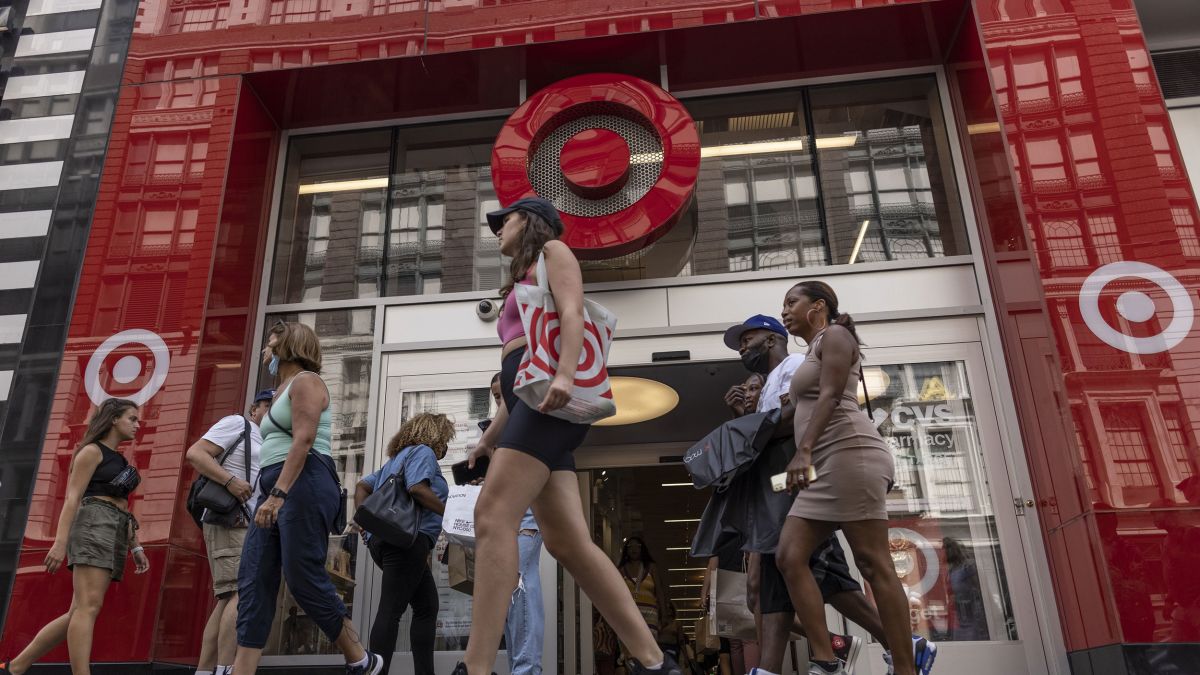This is how Americans would benefit from the Inflation Reduction Act 2:41
(CNN) --
Target just demonstrated how quickly things can change in the world of retail, posting a terrible quarter after nearly two years of soaring profits and record revenue growth.
However, the big retailer promises that things will turn in the other direction just as quickly.
Target was widely seen as one of the winners of the pandemic, winning new customers as shoppers who didn't want to go to physical stores were drawn to its growing curbside pickup and delivery.
But after a disappointing fiscal first quarter when profit fell 40%, Target just had an even worse second quarter.
Earnings fell 90% compared to the previous year.
Tired of inflation, shoppers have opted to purchase essentials like groceries and gasoline over "non-essential" general merchandise that is critical to Target's sales and profits.
It was a stark contrast to larger rival Walmart, which posted only a small drop in profit for the quarter.
Despite this, many analysts believe that Target is still in a good position for the future, that it is not in danger of joining some of the other winners of the pandemic that are now suffering, such as online retailer Wayfair.
On Friday it announced that it had to cut 5% of staff due to expanding too quickly during good times.
advertising
The 10 countries with the most food inflation, according to the World Bank (Argentina and Venezuela are in the top 7)
Target's profit slump stemmed from the deep discounts it had to offer on much of its general merchandise, including clothing, electronics and housewares.
The impact on earnings from such a deep discount was unavoidable.
Still, company executives insist it was the right choice.
"Consider the alternative: We could have held on to excess inventory and tried to manage it slowly, over several quarters or even years. While that might have reduced the short-term financial impact, it would have slowed our business over time," explained CEO Brian Cornell to investors.
"The vast majority of the financial impact of these inventory actions is now behind us."
He predicts a significant improvement in operating margin rates in the fall season.
Inflation changes priorities in the US 0:56
Many analysts agree that Target did the right thing by taking the hit.
Several say the sudden change in consumer buying habits was not the fault of a miscalculation on the part of management.
"For all of last year, the supply chain was very, very tight. Stores were out of stock on many items. They were ordering at a level of demand that was very reasonable," said Bobby Griffin, retail analyst at Raymond James.
"So there was a very rapid change in consumer behavior."
Discretionary purchases by consumers have shifted away from goods to things like travel, Griffin said.
Other experts say Target management wasn't entirely innocent of being caught with too much incorrect inventory.
"My feeling is that this [Target problem] was 70% due to consumer behavior and 30% due to an inventory-related miscalculation," said Eric Schiffer, chief investment officer at the private equity firm. based in Los Angeles, The Patriarch Organization.
There is some hope for all retailers that they can benefit from the large and steady decline in gas prices over the last two months.
The national average price of gasoline is down $1.11, or 22%, to $3.91 since hitting a record high of $5.02 on June 14.
It's gone down every day since then.
That should save households $100 per month on average.
And wholesale gasoline futures point to even lower gas prices in the coming weeks and months.
Target was always going to have more trouble with a sudden shift in consumer spending than Walmart, which gets more than half of its grocery sales while Target is closer to 20%, said Owen Chen, a retail analyst at Cowen. .
Walmart also had to offer sales on its non-essential general merchandise in the quarter.
And Walmart has always competed more on low prices, an advantage at a time when even middle- and upper-income shoppers are worried about rising prices.
Walmart executives reported seeing more business from those high-income households in the most recent quarter, a statement that encouraged their investors.
Inflation in the US, the highest in 40 years 2:15
For Chen, though, the numbers indicate they didn't get those higher-income shoppers from traditional Target customers.
"I think Target's [store] traffic numbers show that it did a good job of keeping its customers," he said.
The number of customers who made purchases at Target increased 2.7% from a year ago in the quarter just ended.
And that's an increase of more than 20% from the same period in 2019, before the pandemic.
Target's shares have underperformed some of its rivals, falling 28% so far this year, compared to a drop of just 5% in Walmart.
Schiffer said he wouldn't be surprised if Target's shares continue to slide, as he believes they are up to 30% overvalued.
However, he doesn't think that means Target is poorly positioned for the future.
"I would stay the course," he said.
"The pace of growth during the pandemic was never going to be sustainable. They will continue to grow, but not as fast."

